Should people pay for not turning up to a restaurant?
- Published
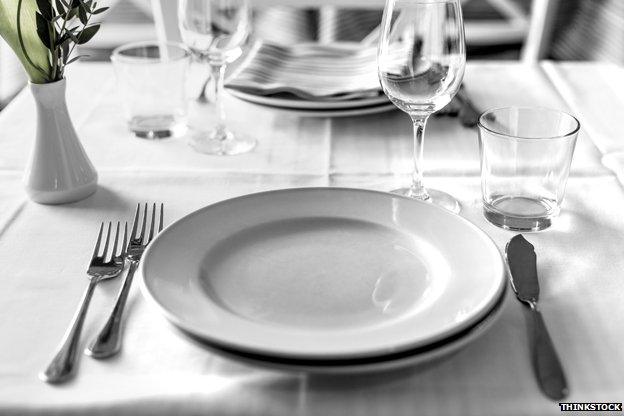
No-shows for reservations are an age-old problem for restaurants. But one restaurateur thinks he has cracked the problem by replacing bookings with paid-for tickets, and he's bringing the system to the UK.
You don't have to watch a Gordon Ramsay show to know that running a restaurant is a precarious business.
And one thing restaurateurs have always hated is when people don't turn up for their reservations on busy nights. Or call to cancel just minutes before. It's never guaranteed that walk-in traffic will make good the losses.
In 2011, a Chicago restaurant started doing what airlines and theatres have done for decades - sell tickets for a seat.
Instead of making a traditional reservation, diners wanting a table at Next can buy non-refundable tickets for a specific day and time.
Next's website explains the aim of the system was to "create a predictable and steady flow of patrons". In other words, cut down on reservation no-shows.
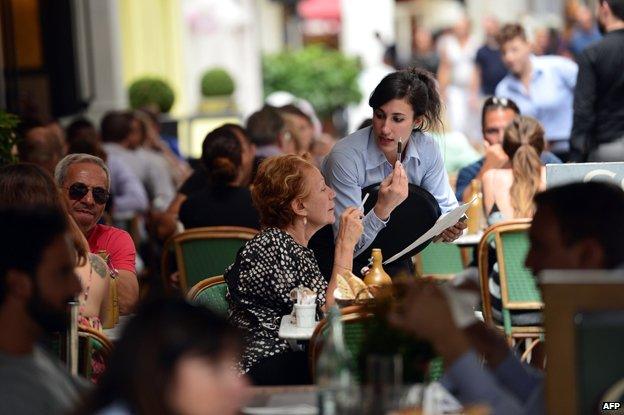
The rate of people not turning up for bookings varies widely - in the UK it is estimated as anywhere between 5-20%, depending on the restaurant.
"For a larger restaurant, like a pizzeria that can seat 100 or more, a few missed bookings most likely won't affect their bottom line, but for a smaller, fine-dining restaurant that only seats a few, one or two no-shows could mean a loss," says restaurant critic Andy Hayler.
Next co-owner Nick Kokonas says all three of his Chicago restaurants and bars now use a ticketing system. Aviary, Kokonas's cocktail lounge, brought in a modified ticket system after two years of operation. Customers who want to secure a seat buy tickets with the money taken off their final bar tab.
Kokonas says the ticketing system has dramatically reduced the no-show rate at his restaurant - it's around 1.5%. Most of those were "short-sat tables" where only some of a party showed up. He says Next had just five full table no-shows for the entire year. The prospect of losing money focuses diners on making sure they turn up.
Other restaurants have followed - Trois Mec in Los Angeles, Coi in San Francisco and Tuck Shop in Phoenix. Twenty more are set to start in the next few months.
Now Kokonas plans to export the system to the UK with three restaurants adopting variations of it. Kokonas won't reveal the names of the restaurants, but said one will use full pay-in-advance tickets where the cost of the whole meal is covered. Another will just sell deposit tickets and the third will offer a hybrid of the two systems.

Drastic tactics
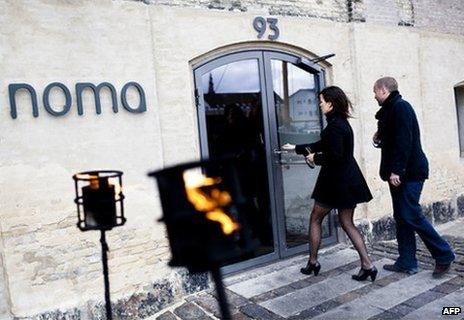
Twitter account No-Shows Montreal was set up in March to publicly name those who failed to honour their reservations, external with restaurants in the Canadian city
Red Medicine restaurant in Beverly Hills, California, has used its Twitter account to list customers who didn't turn up for their reservations, external, starting one list with the words: "All the nice guests who wonder why restaurants overbook... should thank those people below..."
Other restaurants which have used the tactic are Noma in Copenhagen (pictured) and Bistro Bruno in Sydney

Kokonas feels it's fair to discourage short-sat tables, even if most customers don't think of this as a no-show. "They don't realise that we held a table of four instead of a table of two," says Kokonas. "We can't simply call one of the 100 people on the waitlist with 10 minutes' notice and expect them to show up."
Some restaurants use other tactics. Panoramic 34, a restaurant with a 360-degree view over Liverpool, is one of them.
Cathy Frost, the restaurant's chief executive, says no-shows were discussed before the restaurant opened in 2008. Ultimately, management decided taking a credit card number at the time of the booking was the best way to keep it from happening.
Diners are told they'll be charged - £20 per person for a restaurant booking or £10 per person for a bar booking - if they don't show up. According to Frost, it's been effective - keeping their no-show rate to less than 5%.
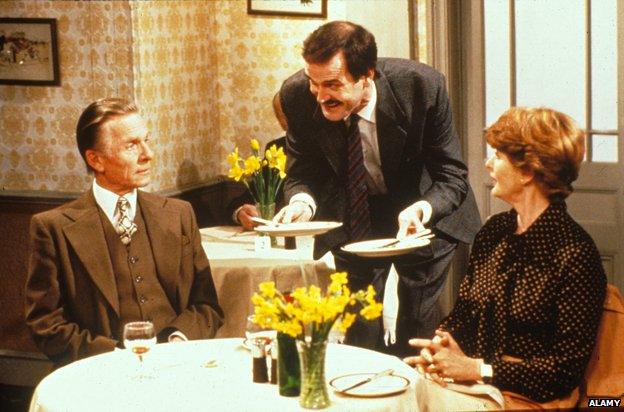
Panoramic 34's policy does allow guests to cancel their reservation up to 24 hours before without penalty, but after that, whether a guest is charged for a missed booking is decided on a case-by-case basis.
"A lot of cancellations are as a result of illness, transport issues, etc, and we wouldn't normally charge in those circumstances," Frost says. "If a guest doesn't turn up without advising us, we usually charge them."
While lost revenue from a no-show reservation can affect a restaurant's bottom line, charging a customer for not showing up can be bad for future business.
"Restaurants get nervous about charging customers because, after all, they're in the hospitality business," says Hayler. "They know if they do, the customer may never come back or tell their friends how horribly they were treated."
And many restaurants in the UK and US have gone in entirely the opposite direction to make sure they are full all the time - abandoning the whole concept of booking.
Many gourmet burger and Asian-cuisine restaurants have long eschewed bookings - prompting snaking queues outside the popular venues. The trend is spreading.
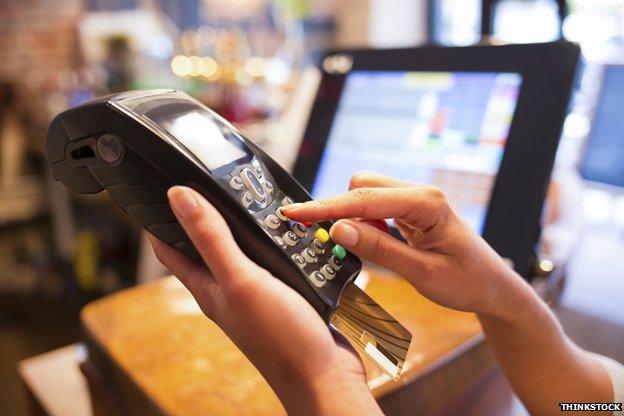
Jose and 10 Greek Street are two of the increasing number of London restaurants where diners can't make reservations for dinner. "Our customers at Jose don't seem to mind," says spokeswoman Hannah Norris. 10 Greek Street has waiting times that apparently can be anything up to three hours.
Dodd's Restaurant in Ambleside, in the Lake District, has plenty of TripAdvisor reviews that praise the no-booking policy. The same applies to Thyme Cafe in Sheffield.
What works for some might not for others and Kokonas acknowledges his ticketing system isn't right for everyone.
"Tickets will work for a certain kind of restaurant - small, chef-driven, limited seating per night, high demand, etc," says Kokonas.
"It's unclear how many places would do it," says Hayler. "It's a bold step and they'd have to be incredibly confident that they can pull it off."

Evolution of the restaurant
The title of "world's first" has been contested by various restaurants in Europe, with The Guinness Book of Records giving that award to the Botin Restaurant in Madrid, Spain.
But the first restaurants opened in Paris in the 1760s, says Rebecca Spang, external, author of The Invention of the Restaurant.
"The first 'restaurants' were called that because they promised to 'restore' a customer's health," says Spang.
"In an era when sophisticated urbanites scorned innkeepers' hearty fare, these new 'restaurateurs' rooms' offered flavoursome bouillons, delicate puddings, and unadulterated wines. Most important, they seated patrons at small, individual tables. Each table could have its own, private meal in a public space. And, of course, each table had its own bill to pay."

Subscribe to the BBC News Magazine's email newsletter to get articles sent to your inbox.